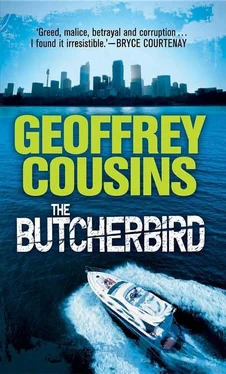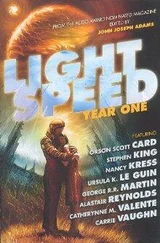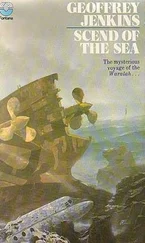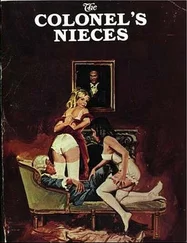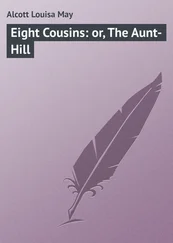Geoffrey Cousins - The Butcherbird
Здесь есть возможность читать онлайн «Geoffrey Cousins - The Butcherbird» весь текст электронной книги совершенно бесплатно (целиком полную версию без сокращений). В некоторых случаях можно слушать аудио, скачать через торрент в формате fb2 и присутствует краткое содержание. Жанр: Триллер, на английском языке. Описание произведения, (предисловие) а так же отзывы посетителей доступны на портале библиотеки ЛибКат.
- Название:The Butcherbird
- Автор:
- Жанр:
- Год:неизвестен
- ISBN:нет данных
- Рейтинг книги:5 / 5. Голосов: 1
-
Избранное:Добавить в избранное
- Отзывы:
-
Ваша оценка:
- 100
- 1
- 2
- 3
- 4
- 5
The Butcherbird: краткое содержание, описание и аннотация
Предлагаем к чтению аннотацию, описание, краткое содержание или предисловие (зависит от того, что написал сам автор книги «The Butcherbird»). Если вы не нашли необходимую информацию о книге — напишите в комментариях, мы постараемся отыскать её.
The Butcherbird — читать онлайн бесплатно полную книгу (весь текст) целиком
Ниже представлен текст книги, разбитый по страницам. Система сохранения места последней прочитанной страницы, позволяет с удобством читать онлайн бесплатно книгу «The Butcherbird», без необходимости каждый раз заново искать на чём Вы остановились. Поставьте закладку, и сможете в любой момент перейти на страницу, на которой закончили чтение.
Интервал:
Закладка:
Mac knew it was true. Despite all his coaching and cajoling, he couldn’t convince Jack to stop talking about ‘profitable growth’, about insurance as a ‘concept of mutual protection’. All that stuff about making neighbourhoods safe and plotting flood areas and God knows what was fine on Sunday, in church, but it sank like a stone in the river of commerce. The market wanted growth, Max was right. And that’s what they’d get.
‘So a little good news wouldn’t go astray, Mac. You see what I mean. We’ve a lot of our clients’ money invested in HOA stock based on your growth story-I don’t have any reason to change that, do I? Not that you can give me any information that’s not generally available to the market. Nor do I want any. But a small dose of good news-that’s the tonic.’
Mac smiled. ‘You know the story, Max. No news is good news. If there was a problem I’d tell you. And, without breaking any goddamn stock exchange rules, I’d also tell you if there wasn’t good news coming.’
He felt the hand on his arm again. ‘Excellent. You always perform, Mac, that’s what we love. And the fishing and the fire and the excellent wine. Speaking of which, here comes your man with the opener. Maybe a quiet word, eh?’
It was exactly the sort of function Mac hated. Why in heaven’s name had he come? There were the flamingos tapping and preening all over the room in a display dance of social pretension that turned his stomach. And he was part of it, he’d joined in the polka without being dragged, which made it worse.
When Archie Speyne had ushered him into the partly finished gallery and directed his eyes upward with a dramatic flourish of his velvet-clad arm, Mac knew he was in for an evening of relentless agony. There, high on the rough plastered wall in discreetly stuck-on lettering, were the words THE BIDDULPH GALLERY. He was unable to stifle a groan, which clearly was not the reaction Archie was seeking.
‘But Mac, it would fit so well. A new home for our masterpieces and the Matisse we’re bidding for, if only, if only we can get it, and you, Mac, you, you’re the one, you’re the only one who fits it all so perfectly. Homes, Matisse-you see it, you must see it.’
Archie Speyne had a curious habit of repeating phrases when he was excited. It was one of many curious habits, several of which were gossiped about in the bars of Oxford Street and Potts Points and none of which, other than the repetition of phrases, would be on show this evening. There was a touch of desperation in the air around Archie. He’d made promises he couldn’t keep and his whole career, his carefully manicured reputation as the darling of the art world, threatened to erupt over him in a flood of molten lava. He could end up like one of those frozen bodies in Pompeii, trapped in a river of disaster and found centuries later, fossilised, featuring on a little stand on the desk of some future director of this very museum. On the other hand, there were some things in Pompeii he wouldn’t mind being trapped with… Archie recovered to renew his assault on Mac, who had wandered out of the half-finished extension to where the drinks were being served. It wasn’t fair, not fair at all. When Archie had made the commitment for the works, when he’d assured the trustees he had the money, the money was there. Rudolph Steinmann had promised it, shaken hands on it, delighted to see THE STEINMANN GALLERY on the wall. It was only when the contract had been drawn up for the gift that things had come unstuck.
‘What is this, Mr Speyne? Twenty-five years? For twenty-five years you put my name on the gallery, then somebody else’s name? Is that what you say? You rub my family name away like so much chalk on a blackboard?’
Archie had grovelled and knelt and bent every which way, explained it was the policy of the museum never to grant naming rights in perpetuity, a policy of the trustees, not his policy, but the crotchety old bastard wouldn’t budge.
‘No. You want two million dollars of my money. I want immortality. That’s a bit longer than twenty-five years. You can’t deliver, someone else will.’
And they had, and the money was in their bank account, and the Steinmann name was on their wall. And Archie was up shit creek without a paddle. He hated crude expressions like that, but he was. So there. He hurried after Mac into the main gallery where one long table for twenty-five guests glittered with glass and silver and tiny candles placed next to tiny vases, each holding a single chrysanthemum placed precisely by Archie’s own hand. Attention to detail was everything, especially when you were asking people for money.
By the time the guests were seated, Archie had regained his composure, if he could be said to possess composure, and was ready to perform his much-loved party trick of introducing everyone at the table with a brief, flattering but amusing pastiche of their social significance.
‘Friends-because that’s what we all are, friends of this marvellous museum, friends of art, friends of our beautiful city and just wonderful friends, because we like you all, we don’t invite anyone to special functions like this that we don’t enjoy-we are gathered here for a very special purpose that I and Arnold Shaw from London will speak about a little later. But I feel I must pique your interest even at this early hour with a name.’ He paused and looked archly around as if an indiscretion of some bizarre nature was about to be revealed. ‘Matisse.’ Another coy pause was made available for the intaking of breath, which did not in fact come. ‘Yes, a name to conjure with. The painters’ painter. We’ve all seen the great works in the Centre Pompidou or the Tate. Can we ever expect to see one in our wonderful extension next door?’
An inappropriate thought-’not unless we can get a roof on’-passed fleetingly through Archie’s consciousness before he ploughed on. ‘We must enable our fellow citizens to view works like this, uplifting works, whenever they wish. And particularly those less fortunate persons in our community who cannot travel to Paris or London.’
There was general murmuring of approval at this. The concept of cold or hunger was difficult to grasp, but the inability to travel to Paris or London was real and terrible to contemplate.
‘We want these pictures of beauty and wonder on our own walls.’ He cast his hands around the walls in a circular motion. ‘Although there is one among us who already has that privilege, as I shall mention in a moment.’
There was a general exchange of inquiring looks at this remark. The burly figure at the head of the table stared mournfully down at the pink cloth and wondered how on earth he could extract himself from this torture. Bonny was spending the week at some sort of retreat to ‘find herself ‘ or something. God knows why. She was easy enough to find. He’d been on his own in the Kimberley for a while and he wanted company. He supposed he could have had dinner with Edith, which would have been novel, but she was always asking him how things were. ‘How are things, Mac?’ she would say in that earnest voice, as if the end of the world was nigh. Even when it wasn’t. Not that it was now. Anyway, maybe he should have had dinner with Edith.
At least he would’ve escaped this lot.
He felt a hand on his lap and turned in surprise to the woman next to him. He’d never met her before and peered at her place card, trying to make out her name in the gloom.
‘It’s Popsie, darling, just Popsie. Such a pleasure to be with the famous Mac Biddulph again. Unbelievable our paths have crossed so seldom.’
In truth their paths wouldn’t have crossed this starry evening had Popsie not carefully examined the table while drinks were being served and surreptitiously moved her name card from near the kitchen entrance to its present cosy and prominent position next to Mac.
Читать дальшеИнтервал:
Закладка:
Похожие книги на «The Butcherbird»
Представляем Вашему вниманию похожие книги на «The Butcherbird» списком для выбора. Мы отобрали схожую по названию и смыслу литературу в надежде предоставить читателям больше вариантов отыскать новые, интересные, ещё непрочитанные произведения.
Обсуждение, отзывы о книге «The Butcherbird» и просто собственные мнения читателей. Оставьте ваши комментарии, напишите, что Вы думаете о произведении, его смысле или главных героях. Укажите что конкретно понравилось, а что нет, и почему Вы так считаете.
